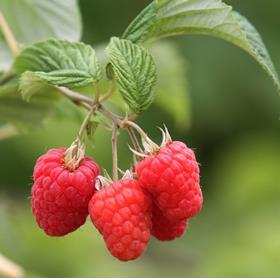
A new raspberry variety with exceptional fruit quality and high productivity has been introduced ahead of its official unveiling later in the year.
The new raspberry, named Glen Dee, was bred by Mylnefield Research Services at the James Hutton Institute, with support from the UK Raspberry Breeding Consortium and the Scottish Government.
The introduction of Glen Dee - which boasts a seven per cent yield increase compared to the popular Glen Ample variety- took place in Dundee yesterday (16 July) at Fruit for the Future 2014, the annual event organised by the James Hutton Institute to present research in soft fruit.
Nikki Jennings, soft fruit breeder at Mylnefield Research Services, said: “Glen Dee is a new late-season floricane raspberry that represents our aim to produce high-quality raspberry cultivars suitable for low input systems that can be grown economically.
'The breeding programme is supported by the underpinning science of the Institute and uses molecular markers to identify important traits early in the breeding process with the intent to reduce the long timescale of the breeding programme.”
Elsewhere at Fruit for the Future 2014, Professor Nick Birch from the James Hutton Institute presented the four-year, multi-institutional SCEPTRE (Sustainable Crop and Environment Protection –Target Research for Edibles) project, which aims to address key gaps in crop protection, especially those arising from loss of current pesticides due to changing EU legislation.
“In general, we show that biopesticides can be combined with endemic and released biocontrol agents to reduce aphid pests of protected raspberry. This is based on two-year glasshouse and two-year polytunnel experiments,” Professor Birch said.
The SCEPTRE results add to the IPM toolbox for raspberries developed at James Hutton, including pest-resistant varieties and enhanced traps for precision monitoring of raspberry beetle, marketed with Sentomol Ltd.
As well as field tours, networking opportunities and fruit tasting, the event also hosted presentations by Paul Sneyd from Haygrove in Ledbury on the latest developments in polytunnel technology, Dirk Aerts from Biobest in Belgium on pollination, and the James Hutton Institute’s Dr Stuart MacFarlane, who talked about a newly-emerging virus, the raspberry leaf blotch virus, and what he and his team are doing to understand this virus and its impact on raspberry crops.



